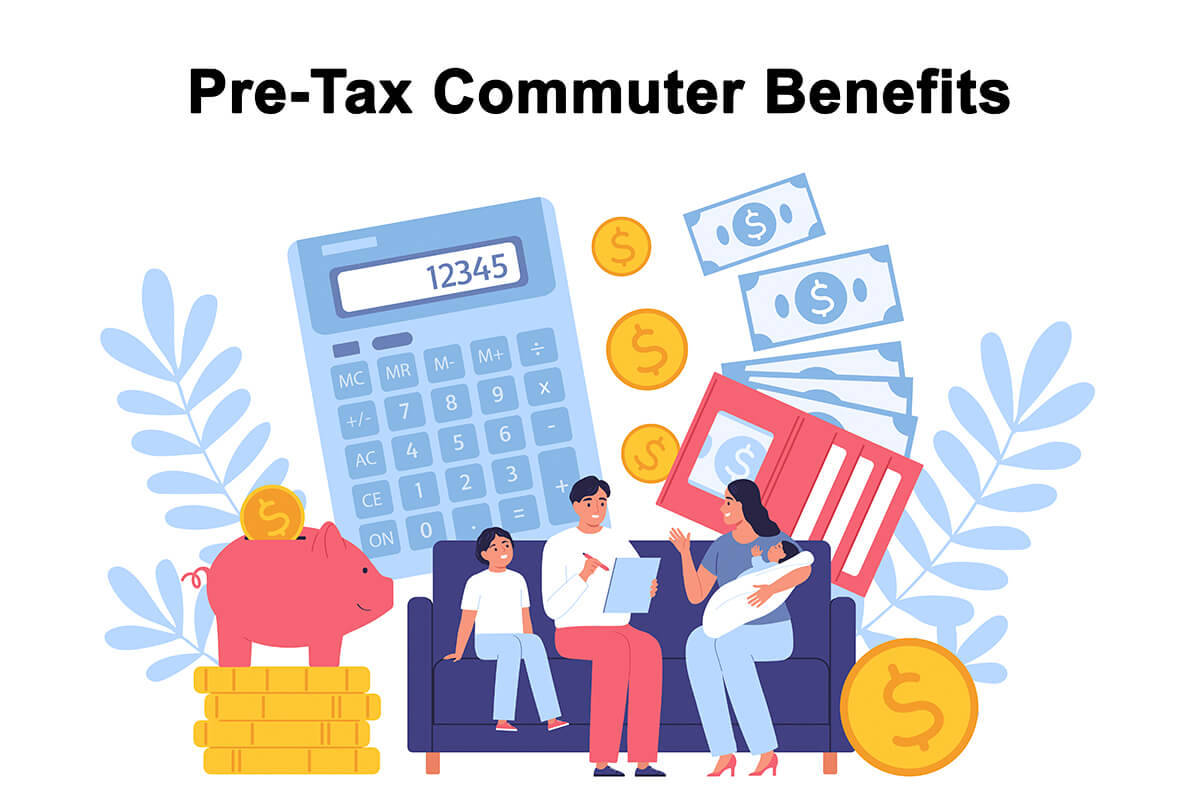In today’s fast-paced world, understanding the nuances of tax benefits can be a game-changer for both employers and employees. Among the myriad of options, pre-tax commuter benefits stand out as a practical and beneficial choice. This comprehensive guide delves into the details of these benefits, offering insights and clarity to help you make informed decisions.
What Are Pre-Tax Commuter Benefits?
Pre-tax commuter benefits are a type of employee benefit that allows individuals to use a portion of their pre-tax income to cover commuting costs. This arrangement not only makes commuting more affordable but also reduces taxable income, leading to potential savings on tax bills.
How Do Commuter Benefits Work?
These benefits function through a seamless collaboration between employers and third-party providers. Employees who choose to participate can designate a specific amount of their pre-tax salary to cover eligible commuting costs. This amount is then deducted from their gross pay before income taxes are applied, effectively lowering their taxable income and providing a dual benefit of tax savings and reduced commuting expenses.
Who Qualifies?
Eligibility for pre-tax commuter benefits is straightforward and inclusive. All employees of an organization that offers this benefit are eligible to participate. There are no complex criteria or qualifications, making it an accessible benefit for a diverse workforce.
Pre-Tax Commuter Benefits Eligible Expenses
Pre-tax commuter benefits cover a diverse range of commuting-related expenses, making daily travel more affordable and convenient. Here’s a breakdown of what’s included:
Public Transportation
- Subway and train fares
- Bus passes
- Trolley fares
- Ferry passes
Vehicle Commuting
- Expenses for vehicles with at least six passenger seats, such as vanpooling
- Shared ride services like Lyft or Uber Pool
Parking Costs
- Parking fees near the workplace
- Parking at mass transit locations, such as Park & Ride facilities
It’s important to note that certain commuting costs are not eligible under these plans, including gas, tolls, personal ride-sharing services, taxis, car insurance, and bike share programs.
How Much Can You Save?
Understanding the financial impact of pre-tax commuter benefits is crucial for both employees and employers. These savings can be significant, influencing the overall financial well-being of the workforce and the financial health of the company.
For Employees
The primary advantage for employees is the reduction in taxable income. By allocating a portion of their pre-tax earnings towards commuting costs, employees effectively lower their taxable income. For example, an employee earning $60,000 annually who allocates $3,600 (or $300 per month) to commuter benefits would see their taxable income reduced to $56,400.
The tax savings can be broken down into several categories. At the federal level, assuming a 22% tax bracket, the reduction in taxable income can save approximately $792 annually. State income tax savings will vary depending on the state’s tax rate; at a 5% rate, the savings would be around $180 annually. Additionally, savings on FICA taxes, which include Social Security (6.2%) and Medicare (1.45%), would amount to approximately $275 annually.
Combining these tax savings, an employee in this scenario could save around $1,247 per year. This significant saving can make a noticeable difference in their take-home pay, contributing to better financial health and budgeting.
For Employers
Employers benefit from payroll tax savings. They save on payroll taxes for the amount allocated to commuter benefits by their employees. For example, with savings of 7.65% on FICA taxes (Social Security and Medicare), if 50 employees participate, each allocating $3,600 annually, the total reduction in payroll is $180,000. This results in approximately $13,770 in payroll tax savings for the employer.
Why Offer Pre-Tax Commuter Benefit Programs?
Offering pre-tax commuter benefits is not just a perk for employees; it’s a strategic decision with multiple advantages for employers. Here are the key reasons to consider implementing these programs:
Financial Incentives for Employees
- Reduces commuting costs, leading to higher disposable income
- Lowers taxable income, offering potential tax savings
Employer Benefits
- Leads to payroll tax savings, reducing overall business expenses
- Enhances the company’s appeal in the job market, aiding in recruitment and retention
- Boosts employee morale and satisfaction, fostering a positive work environment
Environmental and Social Impact
- Encourages the use of public transportation, reducing carbon emissions
- Contributes to corporate sustainability goals
- Ensures safer commuting options, as public transport is often safer than individual driving
How to Start a Pre-Tax Commuter Benefits Plan?
Implementing a pre-tax commuter benefits plan can be a straightforward process with the right approach. Here are the steps to get started:
- Choose a Third-Party Administrator: Partner with a reliable provider specializing in managing commuter benefits. This partnership ensures a smooth setup and ongoing management of the program.
- Plan Design: Work with the administrator to design a plan that suits your company’s and employees’ needs, including determining eligible expenses and contribution limits.
- Employee Enrollment: Launch an enrollment campaign to educate employees about the benefits and guide them through the sign-up process.
- Payroll Integration: Adjust your payroll system to accommodate pre-tax deductions for commuter benefits.
- Ongoing Management: Regularly review and manage the plan to ensure it continues to meet the needs of your employees and stays compliant with any legal changes.
The Bottom Line
In conclusion, pre-tax commuter benefits present a powerful financial tool, offering substantial savings for both employees and employers. By reducing taxable income and lowering payroll taxes, these benefits not only enhance individual financial health but also bolster organizational fiscal efficiency. Embracing pre-tax commuter benefits is more than just a savvy financial decision; it’s a commitment to a more sustainable, employee-focused, and economically sound future.
While these benefits are not directly tax-deductible, they effectively reduce taxable income, leading to lower overall tax liabilities.
While there’s no federal requirement, certain localities have specific mandates. It’s crucial for employers to stay informed about local regulations.
No minimum participant threshold exists, but the program must be universally available to all eligible employees.
